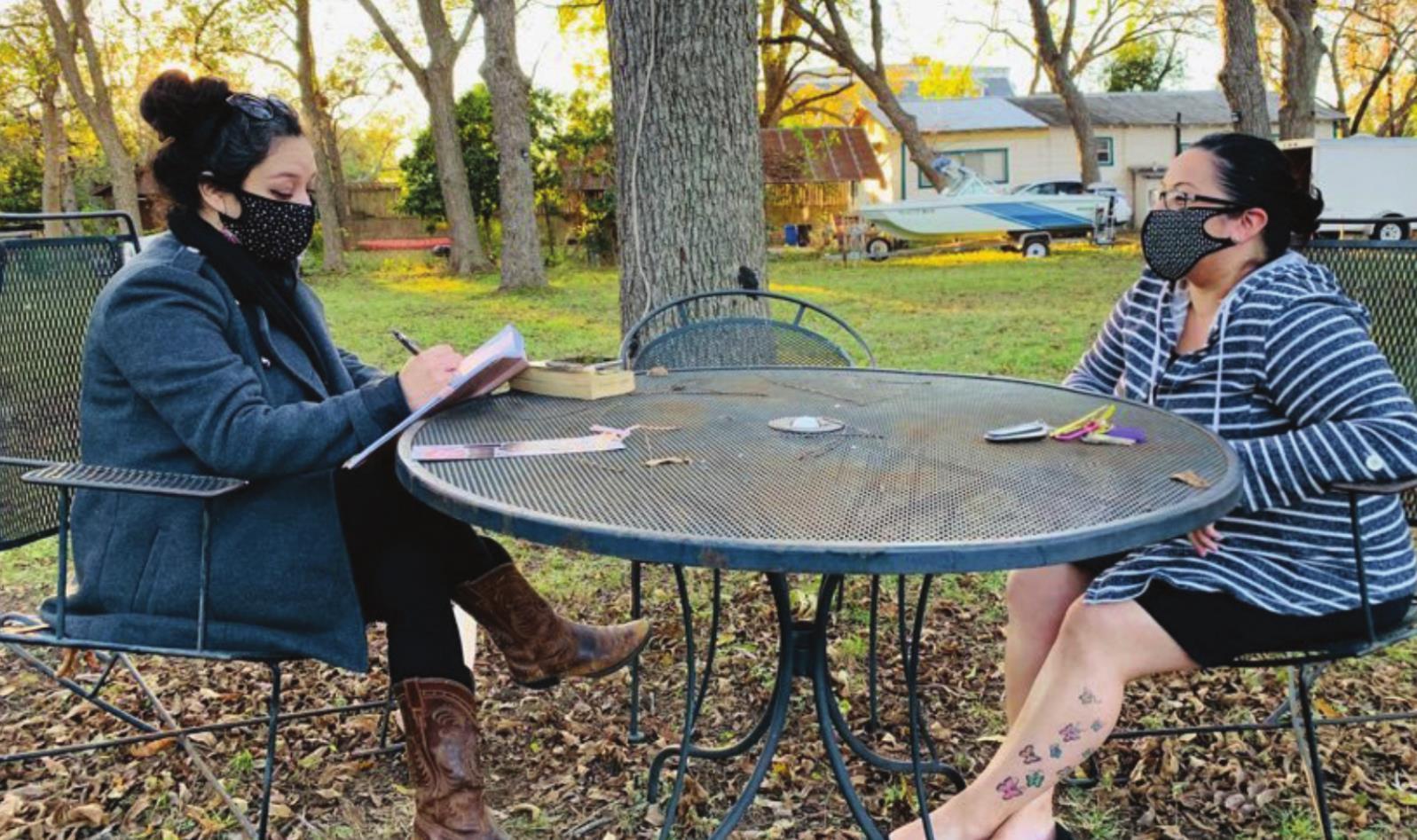
San Marcos residents Victoria Rhemann and Laura Benavides have come up with a plan to help combat these figures: Mobile food pantries that will allow an exchange of nonperishable food items in neighborhoods where they are needed most. Submitted photo
Feeding the community
As we search through a fridge full of leftovers or comb through a pantry of dried pasta or canned goods in search of an afternoon snack, it may seem surprising for many to learn that a number families and college students in San Marcos qualify as food insecure, meaning that they do not have reliable access to a sufficient amount of affordable, nutritious food.
In fact, according to the Hays County Food Bank, food insecurity affects roughly one in seven Hays County residents with 51% of students in San Marcos Consolidated ISD falling under the label of food insecure.
Upon seeing this issue, San Marcos residents Victoria Rhemann and Laura Benavides have come up with a plan to help combat these figures: Mobile food pantries that will allow an exchange of nonperishable food items in neighborhoods where they are needed most.
“The idea came from the realization people in the area are more food inadequate than most of us realize,” Rhemann said.
Food insecurity affects more than 800 million people worldwide, and according to the United States Department of Agriculture, in 2019, nearly 35% of households with incomes below the Federal poverty line were food insecure. Particularly vulnerable are families in single-parent households, as well as for Black and Hipsanic households and college students.
Recent studies by Community College Equity Assessment Lab and studentsagainsthunger.org found that “48% of students faced food insecurity in the previous month, with 22% reporting ‘very low levels of food security that qualify them as hungry.’” According to a study conducted by Texas State in 2017, “rates of food insecurity among Texas State University students may be as high as 28%.”
With so many Hays County and Texas State residents meeting the definition for food insecurity, Rhemann saw an opportunity to make a difference.
“I want the mobile community food pantries to help out anyone in need,” Rhemann said. “It’s also a place for members of the community to give back as well if they are ever in the position to help the next person out, too. It is a gift that keeps on giving.”
Laura Benavides, who owns Private Park in San Marcos, came on board when she saw a Facebook post asking if anyone would be interested in making community pantries.
“I had a bunch of pallets at the time, and offered my pallets to make them,” Benavides said. “After some time, I decided to initiate the coordination of this project. I approached a carpenter about my idea, and we tried a few different design plans. We decided on one that would be best.”
During this time, Benavides said that several local people and other organizations reached out to lend a hand. “I was put in contact with ViVi (Rhemann) because she wants to help the elderly with food security. What I was working on best aligned with her interests.”
Rhemann and Benavides are currently in the process of setting up nonprofit paperwork to maintain the mobile pantries, and to ensure that if businesses are interested in donating, they will be able to use their contribution as a tax deduction.
The mobile food pantries will operate much like the neighborhood lending libraries found around town, or like the fruit distribution baskets for children in a grocery store. If a person has a few extra cans of charro beans they received as part of meal deals from HEB or a package of unopened mac and cheese they gave up when going carb-free for New Year’s, they can simply drop them off at one of the mobile food pantry locations. People can then choose to take the nonperishable grocery items as needed, with no questions asked, to help provide for their families.
“We will go out and maintain the pantries regularly, too,” Rhemann said, “to be sure there is no expired food.”
Once Rhemann received approval from the city, she and Benavides were able to move forward with their mobile pantry plan. The pantry cabinets will be constructed of durable yellow pine by local carpenters who have pledged their time to the project.
“We have a group of carpenters willing to donate their expertise, time and tools for the builds and a professional painter willing to stain or paint,” Benavides said. “We currently identified about 15 neighborhoods to start.”
At this moment, Rhemann and Benavides are accepting donations toward the construction of more pantries through the San Marcos Local News Facebook page. As they move forward, they will open for donations of nonperishable food and hygiene products.
“We are supposed to meet in two weeks to go over paperwork and for me to apply for (nonprofit status),” Rhemann said. “I’m so new to this so Laura (Benavides) is helping me navigate it all.”
For Rhemann and Benavides, this is the finish line for a project that has been in the planning stages for a long while. “I pretty much knew what I wanted to do,” Rhemann said. “I wanted to give back to a community that has given to me. We just had to get city approval first.”
As for when the pantries will be operational, Rhemann said, “The general timeline to have these pantries up and running and the established nonprofit is about two months, tops. This is definitely needed in San Marcos,” she went on. “We hope it helps for years to come.”











